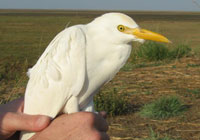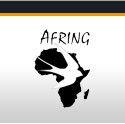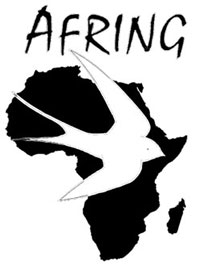Introduction to AFRING
 |
 |
 |
AFRING aims to improve and promote bird ringing initiatives and programmes throughout Africa. Confronted with the general lack of available information on movements of migratory birds, particularly within Africa, AFRING hopes to build a ringing network at critical sites and increase ringing output across the continent.
Background & Development of AFRING
The concept of a coordinated bird ringing scheme for Africa was first proposed at the 3rd Pan-African Ornithological Congress held in South Africa in 1969. Shortly afterwards the AFRING idea was taken further at the 15th International Ornithological Congress in 1970. The following countries were represented at the AFRING meeting: Angola, Ethiopia, South Africa, Congo, Nigeria, Zambia, East Africa, and Senegal. At this meeting two aims were agreed on: 1. to standardise recovery data, and 2. to put all African recovery records on standard forms (Bokmakierie 22:93, 1970). Unfortunately, due to South Africa’s political isolation soon afterwards nothing happened for the next three decades.
In 1998 a paper promoting the idea of AFRING was presented at the Second International Conference on Wetlands and Development in Senegal. One of the recommendations from this meeting was to give a high priority to the development of an intra-African ringing co-ordination scheme (“AFRING”) coordinated under the African-Eurasian Waterbird Agreement (AEWA) - an international treaty dedicated to the conservation of migratory waterbirds across Africa and Eurasia.
In its International Implementation Priorities (IIPs 2000-2004), the Contracting Parties to AEWA identified "the coordination of bird ringing schemes, particularly with regards to migratory waterbirds in Africa" as an urgent priority. In 2004, AFRING was established through a grant from the Government of The Netherlands and the Animal Demography Unit (ADU) was identified as the implementing agency due to its strong ringing administration infrastructure set up under SAFRING. Since 2005, AFRING has received financial support from AEWA through a grant from the European Commission (EC). A number of AFRING related stakeholder meetings have also taken place since 2004 during major international conferences.
AFRING Activities
An important part of the AFRING initiative is training local people to become qualified bird ringers, with a particular emphasis on migratory waterbirds. To date, five ringing courses have already taken place (See section on Ringing Courses). This aims to build capacity for participation in long-term ringing programmes throughout Africa. The regular stakeholder meetings with all relevant persons and groups involved in AFRING are held in order to coordinate and develop activities.
A second essential part of the project is to computerize historical data and create a central database for bird ringing data in Africa. To facilitate the access and handling of the data and the database, and to support coordination between African and European ringing efforts, standardised ringing and recovery forms will be developed.
Initially, there will be a number of species-specific projects; they will demonstrate the potential of an AFRING contribution to information on migratory patterns of species in Africa.
AFRING Infrastructure
AFRING is based at the Animal
Demography Unit (ADU) in Cape Town, South Africa. For more
information please contact us.




